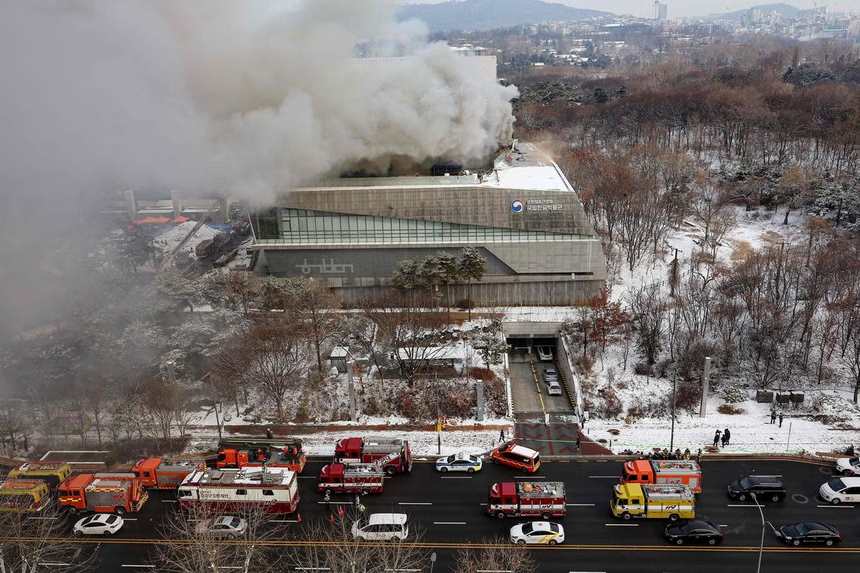Peru Declares Three Days of Mourning Following the Death of Former President Alberto Fujimori

Department of Research, Strategic Studies and International Relations 17-09-2024
The decision to honor the ex-president, who was imprisoned for corruption and human rights violations, has sparked a variety of reactions.
Peru has announced a three-day period of national mourning after the death of its former president, Alberto Fujimori. He passed away on Wednesday at the age of 86 and holds the distinction of being the only Peruvian leader to have been convicted and imprisoned for crimes against humanity.
President Dina Boluarte’s government also issued a decree to fly flags at half-mast on all public and military buildings as Fujimori, who led the country during the 1990s, lies in state at the Museum of the Nation until his burial on Saturday.
“We invite everyone who wishes to bid him farewell in person. We appreciate your support and the many heartfelt expressions of solidarity during these difficult times,” wrote his daughter, Keiko Fujimori, leader of the Fuerza Popular party, on X.
Alberto Fujimori, who served as president from 1990 to 2000, remains a polarizing figure in Peru. Although he faced conviction for human rights abuses and corruption, his followers maintain unwavering loyalty. His decade-long tenure left a lasting impact, which continues to shape Peru’s political landscape. His daughter, Keiko, has since emerged as a prominent political figure, running for president three times and leading a right-wing populist movement.
The decision by President Boluarte to declare the three days of mourning has been met with mixed feelings across the country, which continues to be divided over the legacy of the Fujimori family. Some citizens paid tribute to the leader who, in 1992, used military force to dissolve congress in a self-coup, while others expressed outrage, particularly the families of the victims of the death squads he commanded, for which he was sentenced to 25 years in prison.
Gisela Ortiz, whose brother was killed in a 1992 massacre ordered by Fujimori, condemned the government’s actions, stating, “Fujimori, guilty of human rights violations and corruption, dies – and yet a murderous regime like the one of the 90s honors him.” Ortiz added that the state’s messages of sympathy stand in stark contrast to the impunity surrounding his crimes.
Former legislator Víctor Andrés García Belaúnde also commented on the situation, suggesting that Fujimori’s family should decline the state honors to prevent reopening old wounds.
President Boluarte, who took office following the removal of Pedro Castillo in December 2022, has faced a series of anti-government protests. Her administration relies heavily on the support of a group of lawmakers led by Keiko Fujimori. After Fujimori was granted a humanitarian pardon last year, he gave his endorsement to Boluarte’s government, advocating that it remain in power until 2026, despite widespread calls for her resignation.
Supporters of Fujimori credit him with the defeat of the Maoist Shining Path insurgency and the restoration of the Peruvian economy, which had suffered from rampant hyperinflation. However, many others view his leadership as oppressive, marked by extensive human rights violations and entrenched corruption.
Jackeline Quispe Mendoza, a supporter of Fujimori, spoke at a vigil held outside his family home, stating, “Alberto Fujimori should be remembered as Peru’s greatest president, and many Peruvians recognize this. He was the one who eliminated the Shining Path and its brutal leader, Abimael Guzmán.”
In 2009, Fujimori was sentenced to 25 years in prison after being found guilty of kidnapping and murder in what was regarded as a landmark case for human rights in Latin America. His release in December 2023 followed a decision by Peru’s constitutional court to grant him a humanitarian pardon, even though the inter-American court of human rights had urged the Peruvian government not to enforce the pardon.
Fujimori, originally a university professor, made a surprising entry into politics in 1990 as an outsider candidate, defeating Nobel Prize-winning author Mario Vargas Llosa. Despite dissolving congress in 1992 and governing with an iron fist, he maintained considerable popularity.
However, after a fraudulent election in 2000 and the release of videos showing his chief advisor Vladimiro Montesinos bribing lawmakers, public support for Fujimori quickly eroded. While on an official trip to Asia, Fujimori fled to Japan, his ancestral homeland, and resigned via fax just before starting a third term in office.
After five years in Japan, he attempted a return to politics in 2005 but was arrested in Chile and extradited to Peru in 2007, where he faced trial.
For many Peruvians, Fujimori’s trial marked a long-awaited moment of justice. Carlos Rivera, a human rights attorney who served as a prosecutor during Fujimori’s trial, said the former president will be remembered for his “crimes against humanity.”
In 2009, Fujimori was convicted of ordering two massacres carried out by the military death squad Grupo Colina.
As Jo-Marie Burt, a political science professor at George Mason University, noted, “Fujimori died without ever acknowledging the serious crimes he committed during his rule, which included human rights violations and extensive corruption.” While some may praise his economic policies and his role in defeating the Shining Path, the lasting damage he caused to Peru’s political system and his justification of violence leave a dark legacy that the country has yet to fully confront.





